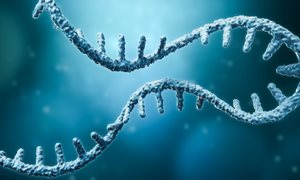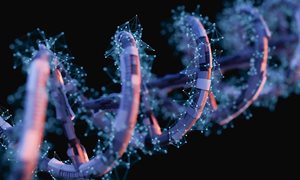19 February 2020
FSHD is one of the most common muscle disorders in adults. It is clinically mainly characterized by progressive weakness of the facial, shoulder and upper arm muscles. A toxic protein, DUX4, is produced in the muscles of patients with FSHD. This causes muscle damage, resulting in muscle weakness due to a reduced amount of muscle tissue.
This finding is especially important because it means that muscle fiber function can be preserved even if the surrounding muscle is damaged. If potential future treatments are able to prevent or reduce DUX4-induced muscle damage, the remaining muscle fibers should be able to generate normal amounts of strength. It is not known whether DUX4 also influences the contractile strength of the remaining muscle fibers.

FSHD is one of the most common muscle disorders in adults. It is clinically mainly characterized by progressive weakness of the facial, shoulder and upper arm muscles. A toxic protein, DUX4, is produced in the muscles of patients with FSHD. This causes muscle damage, resulting in muscle weakness due to a reduced amount of muscle tissue.
This finding is especially important because it means that muscle fiber function can be preserved even if the surrounding muscle is damaged. If potential future treatments are able to prevent or reduce DUX4-induced muscle damage, the remaining muscle fibers should be able to generate normal amounts of strength. It is not known whether DUX4 also influences the contractile strength of the remaining muscle fibers.
Related news items

Five million euro’s for joint research on rare movement disorders
29 March 2022 A Dutch consortium will receive almost 5 million euro’s from NWO to jointly start an ambitious project, called CureQ, on various rare and genetic brain disorders that lead to abnormal movements. Bart van de Warrenburg was one of the main applicants of this ‘Nationale Wetenschaps Agenda (NWA)’ grant. go to page
Development of RNA therapy for rare movement disorder SCA7 Brain Foundation grant for Radboudumc and LUMC
3 February 2022 Neurologist Bart van de Warrenburg, together with Willeke van Roon-Mom and Annemieke Aartsma-Rus (both LUMC/Dutch Center for RNA Therapeutics), has been awarded 400,000 euros by the Dutch Brain Foundation to develop a genetic therapy for the rare hereditary movement disorder SCA7. go to page
Aerobe exercise has a positive effect on brain function in Parkinson's disease patients
18 January 2022 Radboudumc researchers have shown that the brain function of patients with Parkinson's disease improved with regular exercise, which seems to strengthen the connections between different brain areas, while inhibiting brain shrinkage. go to page
New genetic defect links cell biology and protein glycosylation
10 November 2021 Peter Linders, Dirk Lefeber and Geert van den Bogaart together with international colleagues have recently reported on novel cell biological insights, by identifying a genetic disorder in syntaxin-5 which allowed to unravel a new mechanism regulating intracellular transportation. go to page
Impact of COVID-19 pandemic on mental health of Parkinson's patients
10 November 2021 The COVID-19 pandemic has introduced challenges to the social life and care of people with Parkinson’s disease (PD), which could potentially worsen mental health problems. A new study investigated this associaten and explored whether mental health and quality of life can be improved. go to page
